Branzuela v Koo, San Mateo County Superior Court Case Number 19-CIV-01274.
From the court's tentative ruling and online county case records it is Lawzilla's understanding the following occurred:
Summary:
Attorney Zachary Scribner of the Anderlini and McSweeney law firm represents the defendants in a foreclosure lawsuit.
Defendants served plaintiff with a request to produce documents, to admit facts as true, and to answer written questions.
Attorney Scribner filed a motion to compel responses to the discovery.
The judge denied the motion, then sanctioned Scribner's client $2180 for failing to meet and confer before filing the motion.
Chronology of Events:
In the judge's order and online records the following events happened:
July 8 - Meet and confer telephone call between counsel about discovery
July 10 - Scribner sends email confirming agreement plaintiff was asked to provide discovery responses by July 19th and defendant had until August 31st to file a motion to compel
July 19 - 1:29 pm Plaintiff emails discovery responses
- 3:35 pm Scribner receives email
- Scribner signs declaration under penalty of perjury that no discovery responses had been received
July 22 - 9:30 am Scribner requests responses be mailed in addition to emailed
- Plaintiff mails discovery responses
- Scribner files motion to compel* not mentioning July 10th email or the events on July 19th or 22nd
The judge says "in light of these facts" the court makes a ruling that defendants "did not meet and confer in good faith".
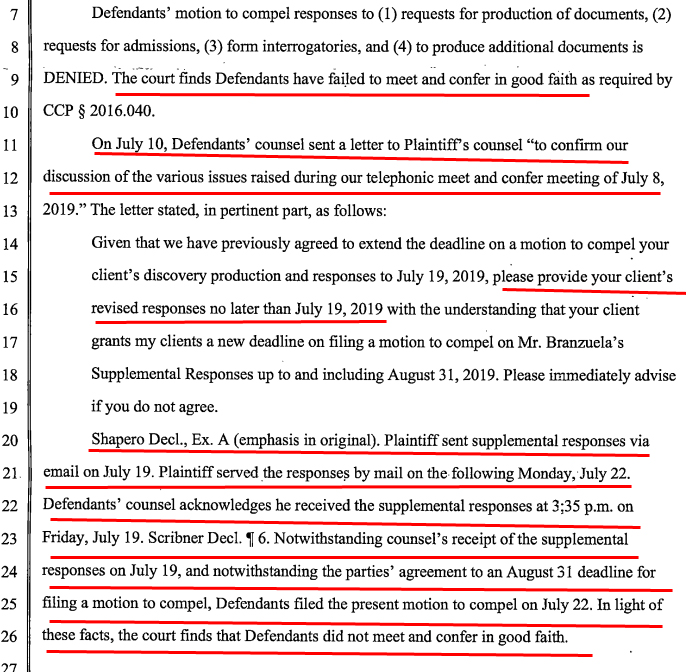
* Scribner's declaration indicated the motion was filed on the 19th.

The court order explicitly says "Defendants filed the present motion to compel on July 22nd."
The San Mateo County online court records indicate Scribner's motion was electronically filed on the 22nd, but does not state a time, and does not indicate if defendant could have filed the motion on the 19th but the court did not date it until the 22nd.
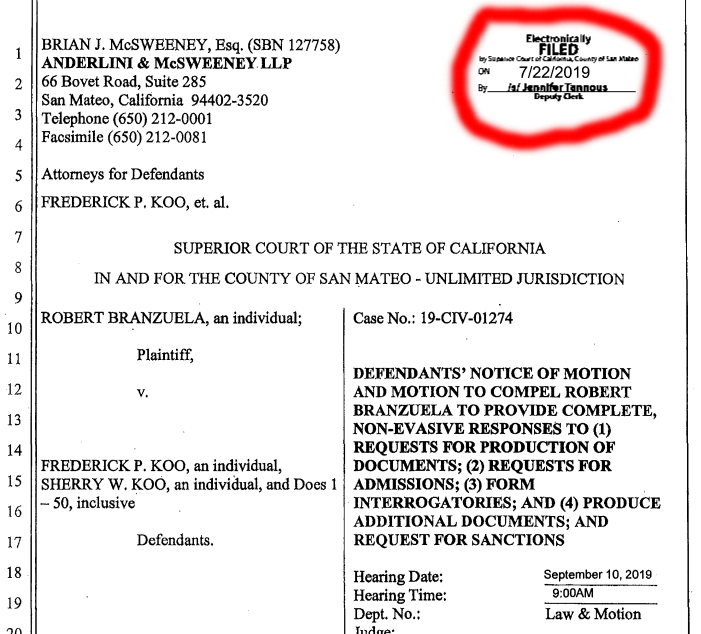
The online court case docket also shows the motion was filed on the 22nd.
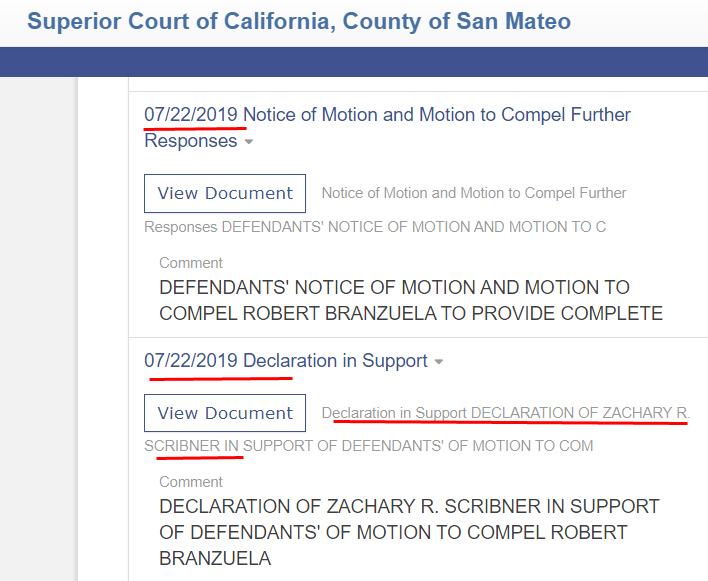
Zachary Scribner Fails to Disclose in Motion July 10 Email, Agreement, and Other Events
Zachary Scribner, Esq., filed the motion to compel discovery and declared under penalty of perjury that he was the attorney for defendants and he had personal knowledge of the facts supporting the motion.
Scribner signed his declaration on July 19th and per the judge it was filed it with the court on July 22nd.
In his declaration the attorney declares there was a July 8th phone call about discovery and that "to date" his law office had not received any discovery responses.
Mr. Scribner provided the judge with various emails - but not his July 10th email confirming he asked for discovery to be provided by the 19th and that defendant had until August 31st to file a motion to compel.
In addition to not providing the judge with this email, Scribner did not mention these facts at all in his declaration.
* He did not mention the discovery agreement.
* He did not mention the deadline for a motion was extended to August 31st.
* He did not mention plaintiff had emailed discovery responses on July 19th.
* He did not mention confirming receipt of the discovery responses at 3:35 pm on July 19th
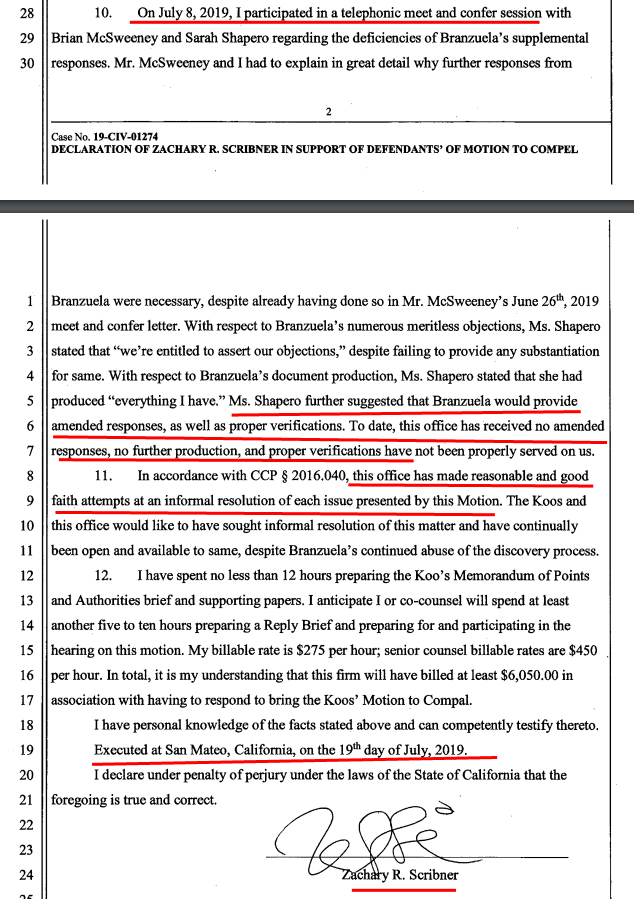
Opposing counsel declared at 9:30 am on July 22nd Zachary Scribner requested that the responses be mailed in addition to emailed. Scribner also did mention this fact in his declaration and motion.

As stated in the court's order, plaintiff's counsel then provided the judge with Scribner's own July 10th email and agreement, and that discovery had been emailed on July 19th and also mailed on July 22nd.
The judge also noted Zachary Scribner confirmed receipt of the discovery responses at 3:35 pm on July 19th.
Judge Orders $2180 Sanctions
The court found that defendants had not met and conferred in good faith before filing the motion to compel.
The judge imposed sanctions of $2180 against Scribner's clients.
Code of Civil Procedure section 2023.020 provides "Notwithstanding the outcome of the particular discovery motion, the court shall impose a monetary sanction ordering that any party or attorney who fails to confer as required pay the reasonable expenses, including attorney's fees, incurred by anyone as a result of that conduct."
In our opinion attorney Zachary Scribner is lucky the judge only ordered sanctions.
From what we read it appears to us the judge could have referred Scribner to the California State Bar for discipline, including potential suspension or disbarment.
That could still happen - someone refers Scribner to the Bar.
Two issues drive our opinion.
First, that Scribner omitted his July 10th email from his declaration, and any mention of it in his motion.
Second, that Scribner either misrepresented, or impliedly tried to mislead the judge, that no discovery responses had been provided - when they had.
In his declaration under penalty of perjury Scribner said "to date, this office has received no" amended responses to the discovery.
In fact, verified amended responses had been emailed to Scribner's office.
Then Scribner himself asked that the responses also be mailed, which they were.
The judge in the order said Scribner's claim the email responses were not timely "has dubious merit" - but ultimately declined to decide the issue because the court was already denying Scribner's motion for not properly meeting and conferring.
According to the State Bar, the California Rules of Professional Conduct are rules designed to regulate the conduct of licensed California lawyers.
Rule 3.3 imposes two requirements on attorneys.
First, an attorney shall not knowingly make any false statement of fact to a court.
Second, an attorney shall correct any false statement of material fact made to a court.
California Business and Professions Code section 6068(d) also prohibits an attorney from misleading a judge by making a false statement of fact.
A violation can result in discipline by the State Bar, including a potential suspension from the practice of law or disbarment.
Although Scribner provided more facts about what happened in a supplemental declaration, he apparently did not file it until after plaintiff's counsel had submitted opposition papers noting the July 10th email and July 19th emailing of the discovery.
It is also not clear to us if Scribner's office actually filed the motion with the court on the 19th or 22nd. Scribner said the 19th, but the judge's order, online case docket, and court filed stamp on the documents each say the 22nd. At this time we are relying on the court's records saying the 22nd. The date could be important in evaluating Scribner's July 19th declaration.
What do you think?
If someone told you they had to take action because they were not getting documents, but then you found out they had already received the documents by email, and had also asked for a mailed copy which was done, and they had agreed action did not have to be taken for another 6 weeks to allow time for the documents to be reviewed, how would you feel?
Considering this was done by an attorney, and a judge imposed $2180 in sanctions, would you want to hire Zachary Scribner as an attorney?
Zachary Scribner was admitted to the California Bar in 2015. Bar Number 302711.
Anderlini and McSweeney, LLP
66 Bovet Road, Suite 285
San Mateo, California 94402
Law School: San Francisco Law School
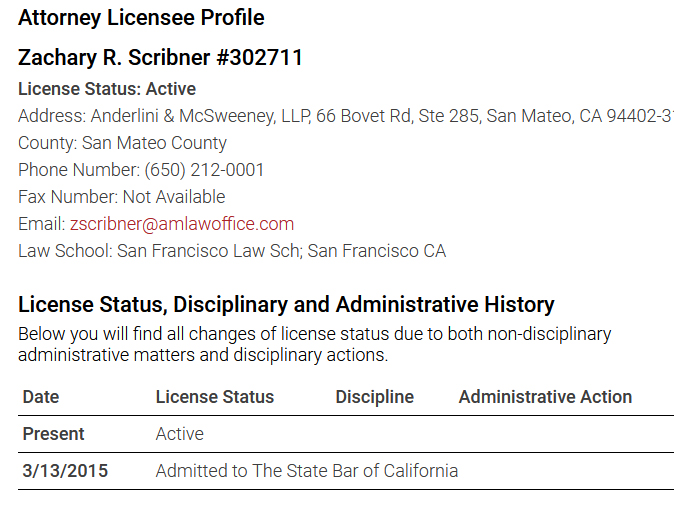
Sanctions are Recoverable as a Judgment - Analysis of the little known fact that sanctions awarded in a lawsuit can be enforced as their own separate judgment. Surprise someone by putting a lien on their bank account, home, wages, etc.